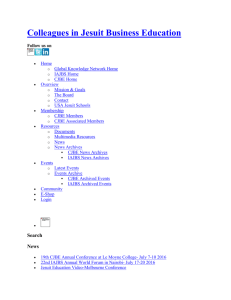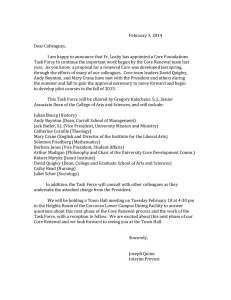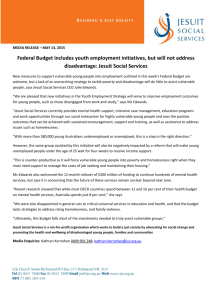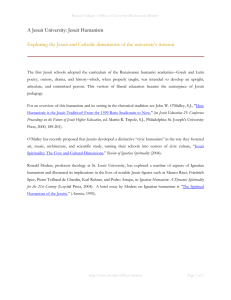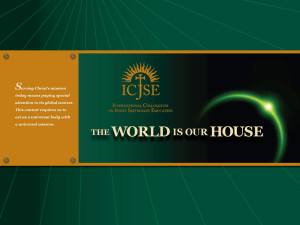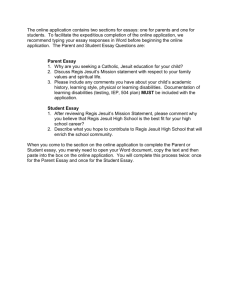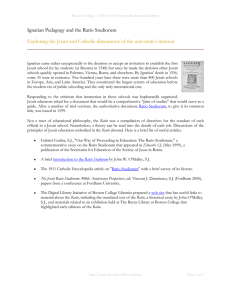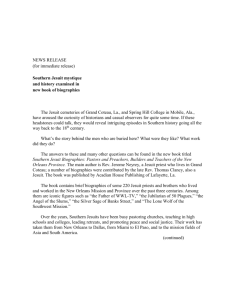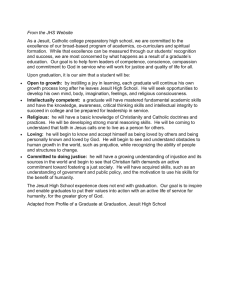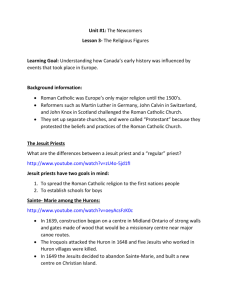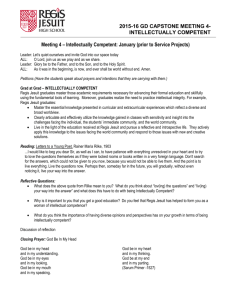Course At A Glance - Ecology and Jesuits in Communication
advertisement
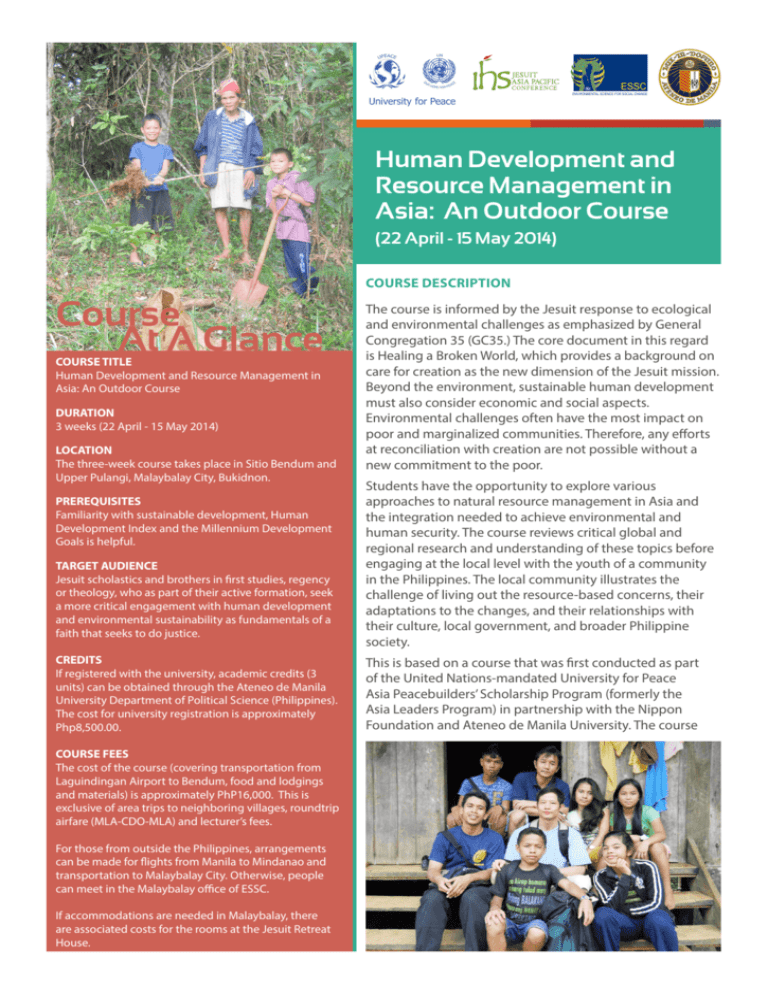
ENVIRONMENTAL SCIENCE FOR SOCIAL CHANGE Human Development and Resource Management in Asia: An Outdoor Course (22 April - 15 May 2014) COURSE DESCRIPTION Course At A Glance COURSE TITLE Human Development and Resource Management in Asia: An Outdoor Course DURATION 3 weeks (22 April - 15 May 2014) LOCATION The three-week course takes place in Sitio Bendum and Upper Pulangi, Malaybalay City, Bukidnon. PREREQUISITES Familiarity with sustainable development, Human Development Index and the Millennium Development Goals is helpful. TARGET AUDIENCE Jesuit scholastics and brothers in first studies, regency or theology, who as part of their active formation, seek a more critical engagement with human development and environmental sustainability as fundamentals of a faith that seeks to do justice. CREDITS If registered with the university, academic credits (3 units) can be obtained through the Ateneo de Manila University Department of Political Science (Philippines). The cost for university registration is approximately Php8,500.00. COURSE FEES The cost of the course (covering transportation from Laguindingan Airport to Bendum, food and lodgings and materials) is approximately PhP16,000. This is exclusive of area trips to neighboring villages, roundtrip airfare (MLA-CDO-MLA) and lecturer’s fees. For those from outside the Philippines, arrangements can be made for flights from Manila to Mindanao and transportation to Malaybalay City. Otherwise, people can meet in the Malaybalay office of ESSC. If accommodations are needed in Malaybalay, there are associated costs for the rooms at the Jesuit Retreat House. The course is informed by the Jesuit response to ecological and environmental challenges as emphasized by General Congregation 35 (GC35.) The core document in this regard is Healing a Broken World, which provides a background on care for creation as the new dimension of the Jesuit mission. Beyond the environment, sustainable human development must also consider economic and social aspects. Environmental challenges often have the most impact on poor and marginalized communities. Therefore, any efforts at reconciliation with creation are not possible without a new commitment to the poor. Students have the opportunity to explore various approaches to natural resource management in Asia and the integration needed to achieve environmental and human security. The course reviews critical global and regional research and understanding of these topics before engaging at the local level with the youth of a community in the Philippines. The local community illustrates the challenge of living out the resource-based concerns, their adaptations to the changes, and their relationships with their culture, local government, and broader Philippine society. This is based on a course that was first conducted as part of the United Nations-mandated University for Peace Asia Peacebuilders’ Scholarship Program (formerly the Asia Leaders Program) in partnership with the Nippon Foundation and Ateneo de Manila University. The course was designed for young professionals and students LEARNING GOALS of development courses, political science, sociology, environmental science, environmental management 1. To explore with the scholastics fundamental concepts and operative frameworks on development, particularly and professionals in the development field. human development and sustainability and their Asia Today interrelations with resource governance Asia is the locus of much change today. Asia is the 2. To provide an opportunity for students to engage with world’s most populous continent, and populations an indigenous community to gain an appreciation are still growing. It is the center of much economic of the context of development and natural resource growth. Asia is home to a growing middle class and management in a local context. many Asian cities are rapidly urbanizing. Despite this growth there is still much inequality, and much METHODS poverty. Agricultural production is changing in 1. Classroom Lecture many countries with the expansion of plantations and corporate agriculture introducing genetically 2. Local Engagement. This involves interactions with an modified organisms. Asian countries are home indigenous community in Sitio Bendum in Northern to more than two-thirds of the global population Mindanao. Opportunities for experiential learning are of poor people. Poverty tends to be highly organized in different sites (river, mountain, forest.) concentrated in the rural areas and many of the rural poor depend heavily on natural resources for their TOPICS subsistence and incomes. 1. Reconciliation with Creation and Our Environmental In the Jesuit context, people in Asia have been Way of Proceeding. Increasingly, Jesuit people involved at the local and global level in the concern have been involved in a serious discourse and and action for the environment and the poor. In commitment to strengthen the relationship of faith 2010, the Jesuit Conference of Asia Pacific (JCAP) and gratitude for creation. This is resulting in a new presented its Ecology Strategy and Action Plan as commitment to reconcile the way we live with the a means to achieving Reconciliation with Creation. way we must care for our environment. The action plan focused on a number of themes that 2. Human development paradigm and development Jesuits and Jesuit people are engaging with: active frameworks. awareness, training and formation, and advocacy. 3. Sustainability Science. An emerging interdisciplinary In terms of advocacy, the focus is on disaster risk approach to respond to global challenges. resilience, mining and water--all of which are also on the agenda for human development and 4. Human security, conflict management and approaches sustainability. to peace. Challenges to sustainable human development While the focus has been on driving economic development, it is clear that not all are experiencing the benefits of economic development and the current patterns of economic growth. Economic growth is not sufficient to reduce hunger and malnutrition in the world. With the launch of the Millennium Development Goals in 2000, there has been a shift to a strategy for human development, a recognition that development as implemented had not succeeded in alleviating poverty or in meeting the needs of the world’s poorest. In the view of the global conversation leading up to a new, post-2015 development agenda, this class is a review of current development frameworks and responses to development concerns, particularly as they relate to resource use and management. FOR FURTHER INFORMATION, PLEASE CONTACT Ms. Mariel de Jesus at marielecojcap@gmail.com Telefax: +63 2 426 0554. 5. Natural resources and governance approaches. This will cover agriculture and food security, forest management, mineral resources, and water. 6. Climate Change and Disaster Risk. Approaches to managing and reducing disaster risk are critical in Asia, where a large population is vulnerable to storms, floods, as well as drought. 7. Urbanization and the Green Economy. How can the urbanization process happen in a way that is environmentally sustainable and socially inclusive? 8. Ethics. Need for a new way to think and act in today’s world. Business-as-usual is no longer an option. 9. Proposal writing and project management. COURSE REQUIREMENTS Assessment of student’s performance is based on participation in class as well as on two required papers. The first is a personal reflection. For the second requirement, students have the option to do an academic paper on an assigned topic or to develop a program proposal for their particular community or area of engagement.
